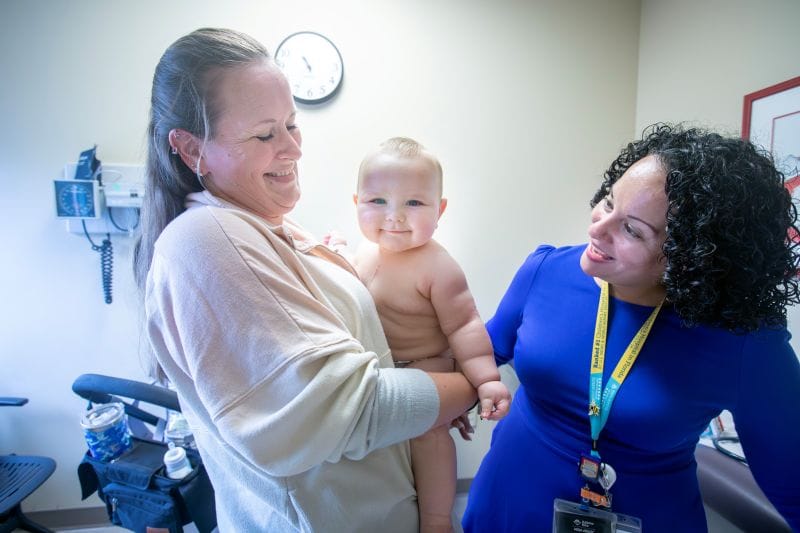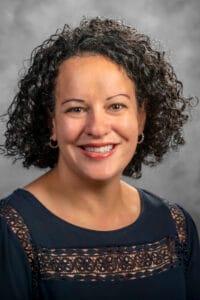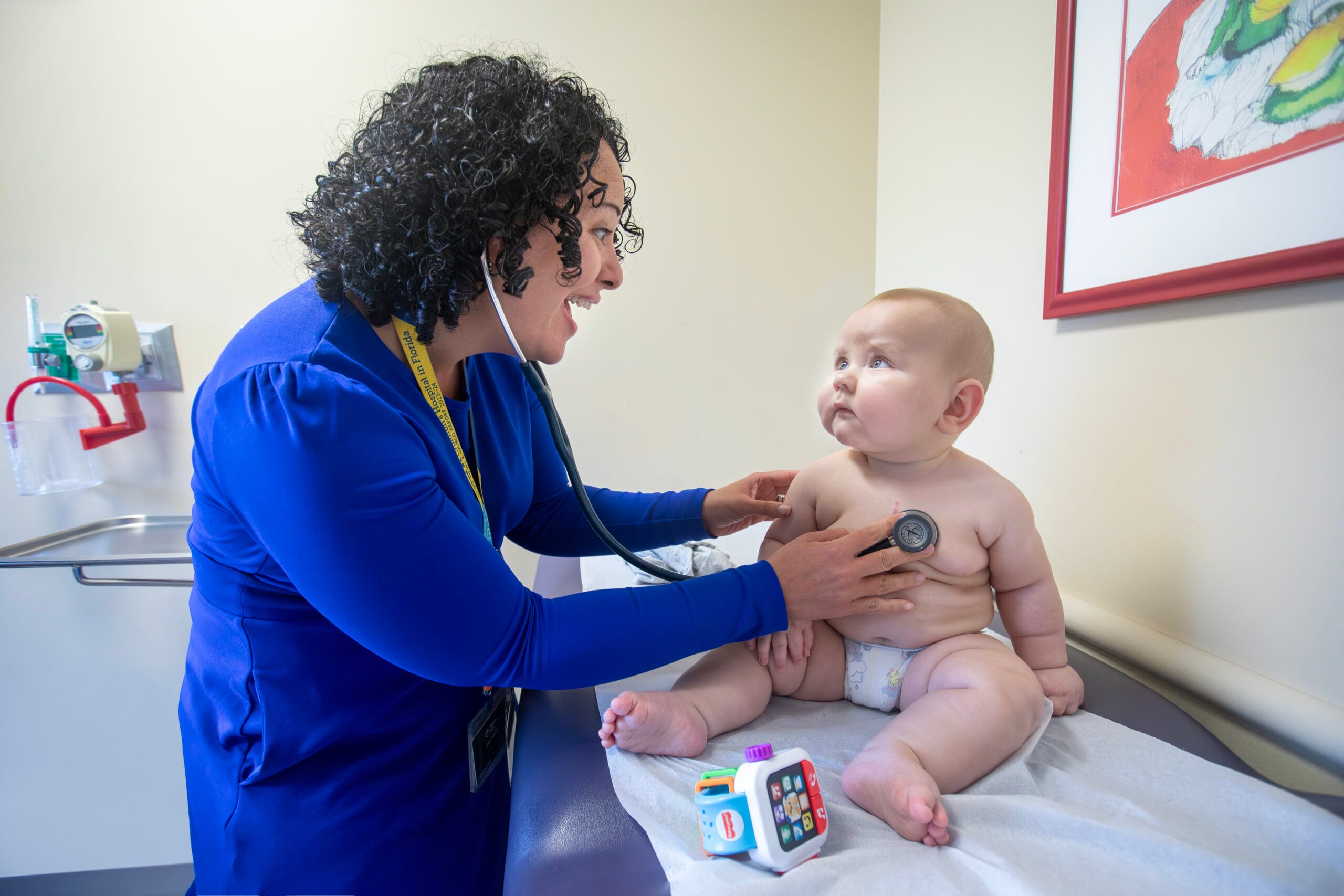Infant Receives Life-saving Heart Care at Johns Hopkins All Children’s Hospital
Baby David’s parents are nearing exhaustion.
But the adrenaline of the moment is propelling them forward.
For a seemingly endless number of hours, they’ve been at their infant son’s bedside in the cardiovascular intensive care unit (CVICU) of Johns Hopkins All Children’s Hospital in St. Petersburg, appealing to their infant as he neared open-heart surgery.
Can you negotiate with someone barely 3 weeks old? Jessica leaves nothing to chance.
“OK, David. Just, please. No funny business,” Jessica says, studying her son’s impossibly tiny hand wrapped around her index finger. “No fevers, no infections, no surprises. I just want to get you well and take you home.”
So far, he has been full of surprises.
Born a day early, on May 12, David was able to go home with his parents, Jessica and David (both father and son are named David) just in time for Mother’s Day weekend.
Beyond a mild case of low blood sugar, which was corrected before he went home, David showed all the behaviors of a healthy baby. He was eating and sleeping as he should, and all seemed to be well.
Days later, when the parents brought their baby to his pediatrician for his first “well baby” visit — things took a dramatic turn.
‘Zero to 60’
Tuesday morning, May 16.
The family had arrived for the appointment just after 10 a.m. with David seeming fine at first, but it was turning into a lengthy visit. He was becoming alarmingly lethargic during the exam.
“They noticed his breathing was labored,” Jessica says. “Everything just escalated, zero to 60.”
Nurses tested the baby’s blood sugar and found it to be dangerously low. They called for emergency transport to Johns Hopkins All Children’s Emergency Center, where the baby was intubated and promptly admitted to the neonatal intensive care unit (NICU).
Baby David was gravely ill.
“They flooded the NICU with every specialty they had,” Jessica says. “I felt like I met 150 people. But they all had a job to do.”
Within 45 minutes, doctors had a diagnosis. An echocardiogram showed David had a rare type of congenital heart disease — specifically, something called interrupted aortic arch (IAA).
“This is where the blood vessel going out from the heart to the body has an interruption in it. It’s not connected,” says Joyce Johnson, M.D., a pediatric cardiologist in the Johns Hopkins All Children’s Heart Institute who treated David in the NICU.
Sometimes, an IAA can be discovered in utero during a 20-week scan. But they’re not always easy to detect.
Normally, when a fetus is in the womb, the baby gets oxygen from the mother’s placenta, and a small vessel called the ductus arteriosus provides blood to the body.
Shortly after birth, the ductus arteriosus naturally constricts as the baby begins to breathe oxygenated air. At that point, the aorta, the blood vessel that comes out of the left side of the heart, takes over. But because of David’s heart defect, only the upper portion of his body was receiving proper blood supply.
While his brain, heart and lungs were functioning, his kidneys, bladder and pancreas were shutting down. The baby was in cardiogenic shock.
Cardiologists commonly order a prostaglandin medication to treat such cases, but in David’s highly unusual case, the medication didn’t work.
Curveball
It would be the first of many “curveballs” this baby would throw his dedicated care team.
David was moved to the hospital’s CVICU, where the heart team prepared for an emergency intervention.
That night, pediatric interventional cardiologist James Thompson, M.D. performed a catheterization procedure on David, placing a stent across the ductus arteriosus to allow blood flow back into the portions of his body that had been deprived of it.
The family and the team caring for David could breathe a sigh of relief. His journey wasn’t over, but his prospects had dramatically improved.

Preparing for Heart Surgery
David needed time to get stronger again.
He still had open-heart surgery ahead of him to repair the interrupted aortic arch. But the timing was delicate.
Over the following days and weeks, Jessica and David maintained a constant vigil at their son’s bedside, supporting both their baby and each other, believing in their hearts he could make it through.
Meanwhile, the pint-sized patient kept clinical staff on their toes.
“A week or so would go by and then something would happen,” Jessica says. “He would spike a fever or something else would happen. The moment you started to trust, he switched up the game.”
Finally, it was time to fix David’s heart.
On May 31, Chief of Cardiovascular Surgery James Quintessenza, M.D., and his skilled surgical team worked to remove the stent and then carefully connected the ascending aorta to the descending aorta, augmenting with a tiny piece of donor tissue, and closing the ventricular septal defect (VSD) in the heart.
The surgery went smoothly.
Gradually, the baby began to recover.
On June 28, the infant who entered Johns Hopkins All Children’s so very close to losing his life left the hospital with his family, healthy and whole.
“David’s case challenged our entire team,” says Quintessenza. “It took the skillset of every individual along the way to create that very high level of care. It’s why we do what we do, to be able to help these children.”
Since David’s hospitalization, follow-up visits with his cardiologist have been stellar.
“David’s story is one of resilience,” says Johnson, his cardiologist. “His repair is beautiful, and he has no residual heart disease. His story is a reminder to all to maintain optimism, even when things seem truly hard.”
When baby David is older, how will his parents tell their son about his own story?
“We will begin by telling him he is a blessing,” Jessica says. “Then we’ll share with him his many beads of courage to show him all that he has overcome. The rest will be up to David.”

Dr. Joyce Johnson was the Guest Editor of the February 2025 Issue of Tampa Bay Parenting Magazine and is the director of the Fetal Heart Program in the Heart Institute at Johns Hopkins All Children’s. She joined the hospital team in 2021 after previously serving as a pediatric cardiologist at Ann & Robert H. Lurie Children’s Hospital of Chicago and an assistant professor of pediatrics in the Division of Pediatric Cardiology at Northwestern University Feinberg School of Medicine.
Dr. Johnson has published a number of peer-reviewed articles, authored book chapters and given talks nationally. Her clinical expertise is in fetal and pediatric echocardiography, and the care of all children with heart disease. Her research interests center around value, cost and outcomes in congenital heart disease.
Dr. Johnson completed her pediatric internship and pediatric residency at Oregon Health and Sciences University in Portland. She then completed a fellowship in pediatric cardiology at University of Utah at Primary Children’s Hospital, followed by a fellowship in advanced non-invasive imaging at Ann & Robert H. Lurie Children’s Hospital.
She earned her medical degree from the University of Pittsburgh School of Medicine. She also earned a Master of Science in clinical investigation from the University of Utah in Salt Lake City.
RELATED:
Meet Levi, the ‘mayor’ of Johns Hopkins All Children’s Hospital
Johns Hopkins All Children’s Hospital Brings After-Hours Pediatric Urgent Care to Tampa
- Logan’s Life Changing Surgery at Johns Hopkins All Children’s Hospital to Repair a Bilateral Cleft Lip and Palate
*Presented by Johns Hopkins All Children’s Hospital | Guest Editor Feature Originally published in the February 2025 issue of Tampa Bay Parenting Magazine.


